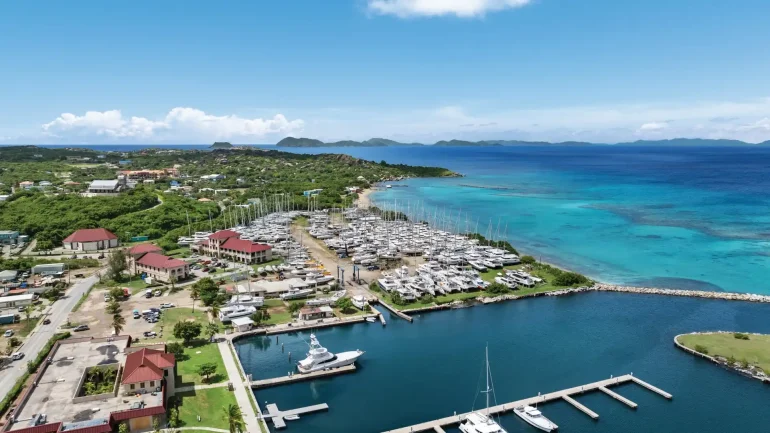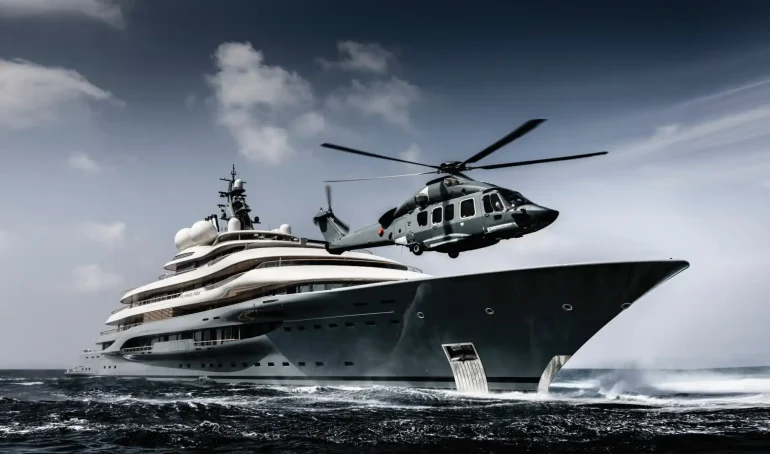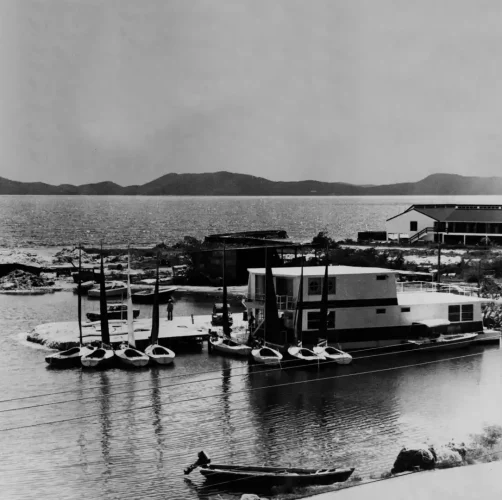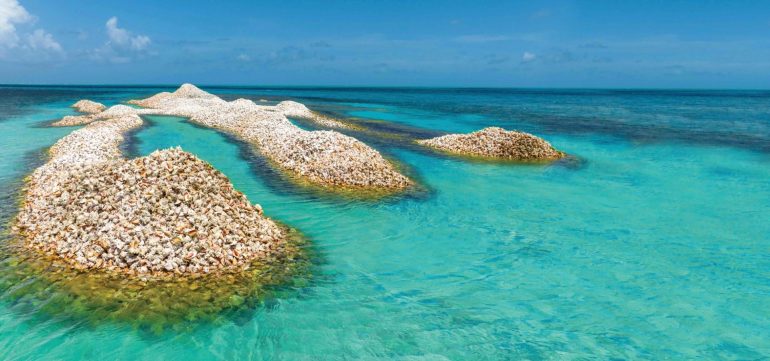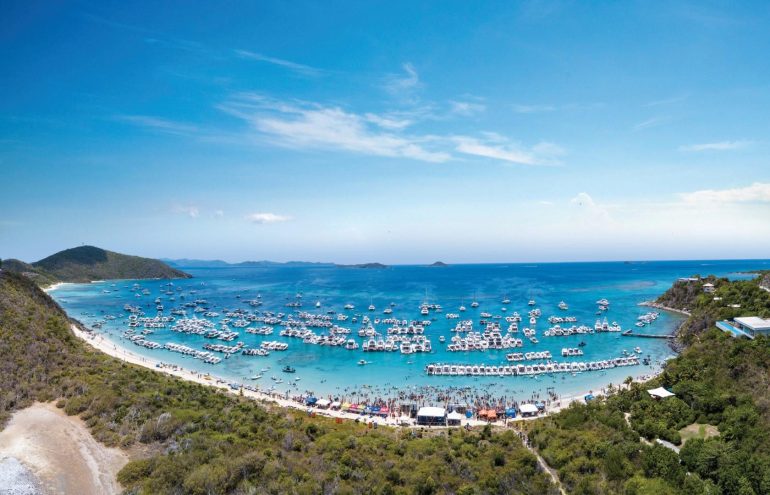The Charter Yacht Business Faces Tough Times – The 2008 BVI Charter Yacht Society's Boat Show takes place against a backdrop of immense economic uncertainty. Are we headed for a devastating depression or are we to expect just a mild ripple on our business waters? Time, of course, will be the judge of that. In the meantime this year's show is over-subscribed with charter vessels jockeying for the attentions of the brokers who can make or break the fortunes of individual yachts.
In order to understand the intricacies of the charter business and to get an insider's glimpse of the industry, BVIYG recently sat down with two of the biggest clearing houses, CharterPort and Regency Yacht Charters, to get their informed input and their projections for the coming year.

As the representatives for individual yachts and as the interface between charter brokers and the yachts, clearing houses take care of many of the details that bedevil yacht captains and crews, including helping owners find crew, assisting crew with work permit applications, and helping find suppliers and technical assistance for captains and chefs—in fact, managing all the details of a busy yacht's life so the crew can operate with maximum efficiency and a modicum of enjoyment and the owner with an acceptable degree of profit. Consequently, the clearing houses have their collective fingers on the pulse of the industry.
Kathleen Mullen, Regency's principal, has been active in the charter brokerage and clearing house business for over 20 years. Regency has recently entered into an alliance with Northrop and Johnson, a major yacht broker, allowing Kathy to engage in the sale of large (and larger) yachts worldwide.
Dick Schoonover has been the face of CharterPort for many years. CharterPort is associated with Southern Trades, which handles the “discreet sales of active crewed charter yachts,” as their literature puts it.
The state of business
Kathy Mullen (KM): A lot depends on the future of the global economy—but the great thing about the Internet and the thing we need to take advantage of is that our markets are more global than they've ever been. Soon I'll be going to the Monaco show to meet with clients and to show them boats over there. There are Russians who still have lots of cash who are buying boats for chartering. We just have to reach out to the market that's still working out there.
Dick Schoonover (DS): I've been preaching doom and gloom since about March but the (bookings) numbers don't show that, much to my surprise. At the end of August we were on par with last year.
This whole financial meltdown in the States is kind of scary. It's not so much affecting the charterers out there as it might affect yacht owners. If the banks aren't writing loans then pretty soon someone will sell the boat so they can use the money for something else. It's all happening too fast, nobody knows what's going on.
People talk about how Europeans have lots of money but they really don't. Eggs and beer and bacon and milk suck as much out of their income as they do for somebody who lives in North America. They're not dripping with money—well, they're only dripping with money if they happen to come over here with euros! But they're not perceiving that they're rich.
New boats, new owners
(KM): The people I've been working with all tended to make their own money, they didn't necessarily grow up wealthy. Most of them enjoy family time and a boat gives them a specified period of time where they can walk away from the office; they get their kids to come down. The kids are happy to go on the boat, it's a positive thing. It's a way to relax and to enjoy life because they've worked hard to make their money.
Another thing I hear, and it depends on the size of the boat, is security. They don't have to worry about staying in a hotel—where are the kids? They won't be getting into problems when they're out and about. You have a professional crew. You're private on the boat so you don't have to worry about, say, having your picture taken or having a kidnapper–it's weird but there are a lot of people who have a lot of money but then they worry about issues like that.
(DS): I've had people who sold their boat and moved up to say a 76-foot boat and discovered they couldn't fit into the places they liked to go. You pull in and suddenly, “Wow, this is pretty tight.” It used to be OK at 60 feet. All these boats are getting bigger. When I started in this business there were plenty of 42-foot sailboats and no catamarans. And now there's not a whole bunch of 42-foot sailboats and there's lots of catamarans.
(KM): When I first came and sailed down here in the islands it was a big deal if you had a shower down below. People had deck showers that they'd put up and that was it and had one head for three cabins and that was considered fine. And then people started getting into fancier boats, double beds, queen-sized beds, air conditioners and it's continued to evolve. So if you look at the history of the charter business, there's always been an evolution to where the new styles of boats that come in are the most popular—that's why the cats are popular now.
Owners will charter to mitigate costs. It keeps crew in good form since they have a focus and a schedule. And crew earn extra tips. There are niche markets where you can do pretty darn well and your crew can cover from half to 100% of your overhead. If you're talking about a 120-foot boat with five or six in crew you're usually talking of an annual budget, depending on where you're going, of one-and-a-half to two-and-a-half million dollars a year so covering a big portion of that makes it much more affordable. These guys didn't make their money by being slow. Contemporary electronics makes a huge difference as they can do business while on the boat.
(DS): Anything 120 feet and up is always for sale. It's just a commodity. They're not going to stop chartering unless somebody buys the boat.
Mega-Yachts and the BVI
(DS): When the bottom dropped out 5 or 6 years ago, that was the one part of the industry that was still doing well and continued all the way through, in sales and new yacht orders. We're talking about the higher end. Our 100-foot motor yacht is tiny as these things go. Over in the Med this year, people in that size range were hurting. (But at) 140 feet, 200 feet, it's “What recession? What depression?” Those are survivors. Those people will still be around. But does the BVI have the facilities? Not at all. You could get, what, two, three, four big yachts into this marina? That's an issue here. People have talked about it, they've planned, they've said they're going to do this but nothing's happened.
(KM): It would be great to have more mega-yacht facilities but not at the risk of destroying the environment. Sometimes when there are restrictions and people stop to think about it then it makes some of the older facilities more valuable and you can think about retrofitting them to accommodate larger-scale yachts. You don't come here to the BVI to be sitting on the dock to see and be seen. You go to the south of France for that. We just need to be sure we don't recklessly develop here.
Having another marina or two that can handle large boats, that's fine, but it's not like we need tons of dock space. At Yacht Haven in St. Thomas it's a nice-looking dock but it's only used part of the year and so you've got to make sure you're not building something predicated on year-round because I don't think you'll have the large yachts here year-round. Generally speaking it's always going to be a transient group. You don't want to tax them too heavily or make the whole customs/clearance procedure too difficult.
Crew and training
(DS): More and more Americans are now eschewing the Coast Guard licence and going straight for the RYA/MCA level fours because it opens them up to the bigger scheme of things and if they wanted to be on a bigger yacht they'd have to do it anyway because not that many vessels are flagged US.
(KM): Staff come from all over. Red Flag countries are big but there's been a push because boats are getting larger, for crews out of places that are used to cruise ships and commercial vessels: Greece, Croatia, a lot of stewardesses and service staff from the Philippines. On many boats now you have a multinational crew and there are some boats that are US flagged but the larger boats are probably going to be flagged elsewhere. The fact that US-flagged vessels must be commanded by a US citizen is very restrictive in today's market.
Training for a Captain's licence has gotten much more complicated over the past four or five years, so you really do have to have the right tickets. Engineers are starting to have to have tickets depending on the size of the boat, while the chef would have their own set of training and qualifications, the purser and stewardesses will have taken basic accounting or similar training, and stews would have etiquette skills, etc. The whole focus is also on having fun. The crews that do the best are the ones that gauge both the owner of the boat and the guests that they send down or that charter the boat as to what they want to do. A lot of the times the crews on many of the boats, whether private or on charter, are also trying to show the people how to stop and smell the roses and make suggestions because otherwise they just wouldn't know what to do.
Security
(DS): Every once in a while there'll be a spate of theft activity on the docks. Someone will have figured out that it's easy pickings. Eventually they'll get caught or scared away or something. But out on the water, on the circuit, it hasn't been an issue. The point is that it is big news because it is so rare.
We've had people boarded down-island in places like Dominica and St. Vincent this year but I suspect they didn't ask ahead of time if it was a good place to anchor. Clearly there's a lot of places you just don't go just because of security. The beautiful secluded cove has eyes watching you as you anchor. Now over on Peter Island or Norman Island it's not an issue because nobody lives there. So around here that's not such a big deal. The big deal would be somebody pilfering off the dock.
(KM): Crew don't need a security background per se but they are looking for professional crew who are trustworthy and who do sign confidentiality agreements. They don't talk about their owners and they never actually mention the name of the owner. They might talk about Mr. Sam, the owner or the charter guest, but that's his first name—nobody talks about what his last name is. They do want to keep a low profile and relax and enjoy. They're just folks too and they want to be able to feel comfortable being out on the water and meeting people and just being folks, so to speak.
(DS): The paperwork of coming and going to USVI has increased dramatically. The amount of time you have to stand around waiting in Cruz Bay can be onerous especially in the holiday season when you've got guests wondering why they can't go shopping. You have all these people in the Federal Government in Washington coming up with rules to track the honest people. Because you can't track the dishonest people!
The BVI
(DS): Right now I have no reason to feel sad about the forthcoming season. That being said, we haven't seen the shakedown yet from all the stuff that's been going down in New York and Washington. It could change entirely. (The BVI) is an easy place to live and an easy place to do business.
(KM): It's a very fine line that it's important for the BVI to navigate. There's great potential as long as they don't go the St. Thomas route with that cruise ship passenger who's going to spend $50 on T-shirts and go away. If they emphasize that end of it and don't leave the BVI as an exclusive destination—pristine.
And yes, you might not have the shopping you have in other locations, but you come here for other reasons. People with this kind of money live in places and have accessibility to goods, so that's not what they're looking for. They're looking for exclusivity and relaxation and getting back-to-nature. So I think it's important for the BVI to step up with things like the sewage treatment that they're working on here—anything that the BVI can do to market itself and become a Green country that thinks about those issues will help keep it in the forefront of the well-to-do market.


